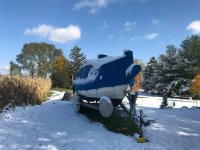Looking for advice from other crazy cold loving adventurers. Alaskans and Canadians please chime in! Giving serious consideration to wintering in fresh water with air temperatures well below freezing. Water is freshwater but unlikely to freeze beyond a shallow surface coat near shore (very deep lake). There will be significant cumulative snowfall, usually in predictable events. I have winterized my fresh water systems, am running sta-bil in fuel, can possibly keep a heater on shore power, and a small fan in the berth for longer stretches where I am unable to get to the boat Because of road conditions, life happenstances, etc. Any advice on how to best do this is much appreciated. How do I keep bilges from freezing? Rv antifreeze? Am I over thinking it?
Thanks in advance!
Nigel
Thanks in advance!
Nigel

